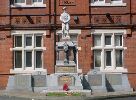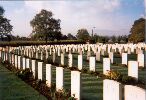
Newton-le-Willows and
Earlestown War Memorial

| OTHER WARS |
 |
Newton-le-Willows andEarlestown War Memorial |
 |
| The
Great War Roll of Honour |
|||||||||||||||||||||||||
Private John Bull was born in the Gorton district of Manchester
the son of Amos Bull. On the 8th July 1901, he married Mary Smith at St Peter's
in Newton-le- Willows. They had five children- Kathleen was born on 12th April
1902 at Warrington; William was born on 9th February 1908, in Bolton; Annie
was born on 12th March 1911 in Ashton; John was born on 15th July 1912 in Newton;
and Selina was born on 2nd August 1914 in Warrington. Kathleen had left school
when John died in 1916, but William and Annie both attended Earlestown Council
School.
John was a labourer employed in the forge at the L. and N.- W. Railway Co.'s
Wagon Works (Viaduct Works) at Earlestown prior to joining the army. He was
one of the first to enlist, doing so on 29th August 1914. According to his Attestation
Paper, he was 5 feet 51/2inches in height, weighed 1391bs., and had a 39 inch
chest. He had a dark complexion, hazel eyes and dark hair. He declared himself
to be a Roman Catholic. (St. Peter's, where he married, is an Anglican church.)
John certainly does not seem to have been a model soldier during his two years
service. Whilst with the 4th Battalion at Seaforth he was "absent from
12 noon on the 11th inst. until 11 p.m. 13.10.14", for which he was "admonished".
A week later, he was absent from Tattoo 19.10.14 until reveille 21.10.14, earning
5 days confined to barracks. A week later, he was absent from Tattoo until 8
a.m. 28.10.14, this time receiving 7 days confined to barracks. Seven days meant
overlapping the following weekend, therefore the next entry on his conduct sheet
reads:
"I. Breaking out of camp whilst a defaulter 2.11.14 and remaining absent
until apprehended by Civil Power at 8.45 p.m. 4.11.14
II. Deficient of bedding."
This time, as well as having to "pay for deficiencies", he received
four days Field Punishment No.2. These four absences also resulted in John losing
a total of eleven days pay.
He appears to have behaved himself the next weekend before going absent from
reveille on 16.11.14 to 8 a.m. 18.11.14, earning another 3 days F.P.No.2 and
forfeiting three more days pay. His next absence was
not until late February 1915, but on 1.3.15 his "breaking out of[?] whilst
attending hospital and remaining absent until found in bed at 6.50 a.m. 2.3.15"
earned him an admonishment and loss of a days pay. Perhaps, there was not enough
time for a more serious punishment as his papers are stamped "Embarked
5-3-15", John now being posted to France with the 4th Battalion.
He was not long in France before he received a gun shot wound to his face. His
Casualty Form records his being "missing" on 27th April 1915, and
the first date regarding his wound is 29th April. His wound was
sufficient for John to be sent back to "Blighty", ending up in hospital
in Oxfordshire.
He clearly recovered as by 15th August 1915, he was absent again until 12 noon
on 20.8.15, this time getting 6 days F.P No.2 and losing 6 days pay. At this
time he was with the 3rd Battalion at Pembroke Dock. Just by way of a variation,
he was confined to barracks for five days in mid-October for "not scrubbing
the floor when ordered". He does not seem to have been absent again until
March 1916.
He was posted to France again on 17th May 1916, with the 1st Battalion, shortly
before the start of the Battle of the Somme. On the 8th August, the 2nd Division,
which included 1st Battalion of the King's (Liverpool Regiment) took part in
the Attack on Guillemont:
"The 1st King's (6 Brigade) advanced eastwards, north of the railway, and
three companies reached the station. The fourth found that the Germans had re-occupied
their front line and therefore could not support the attack. 17th Middlesex
attacked from Waterlot Farm and entered ZZ Trench, but failed to join with 1st
King's."
It was during this attack that John was shot in the left elbow, according to
his casualty paper but right arm according to Newton and Earlestown Guardian,
and also went "missing", the latter fact being recorded in the Guardian
of 8th September 1916. Two weeks later, they reported that Mrs Bull had received
a postcard saying that her husband was a prisoner of war at Gottingen, Germany,
but was unable to write himself as he was wounded in the arm.
The Guardian of 13th October 1916 carried news of his death. A
letter was sent to Mrs. Bull from Company Sergeant C. J. Shea giving her
the news that her "beloved husband passed away at 7 minutes past 4 on the
afternoon of the 22nd. Sept. He was recovering well from his wound, but somehow
contracted pneumonia, from which he succumbed. He was laid to rest in the Cemetery
at Gottingen on the 25th. September, followed by two of his Officers and a number
of his comrades from the Camp."
The Death Certificate is interesting in that it
gives John's occupation as 'linen weaver', rather than a labourer in an engineering
forge. Mary remarried on 20th December 1916 and became Mrs. Donohue. There was
a gratuity of £52 and an allowance of 14/6 a week (increasing to 17/6
from 4.4.17) paid with effect from 26.3.17 for the five children.